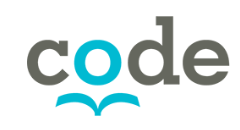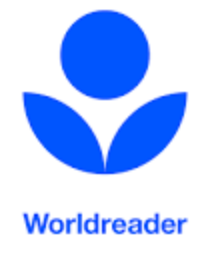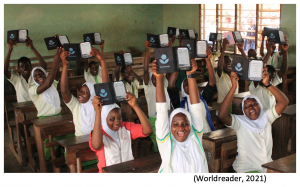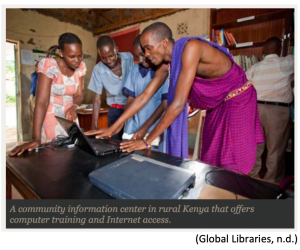“At a time when we need to reinvent a world of hope, literacy is more important than ever. On this International Day, I thus invite all those involved in education to redouble their investments and mobilize all their resources to unleash the potential of each individual in the service of a shared world.”
— Audrey Azoulay, UNESCO Director General, on the occasion of International Literacy Day
This week I explored a variety of library projects in developing nations and have chosen to focus on CODE and Worldreader. Both of these library projects were new to me and I wanted to explore what type of literacy opportunities these projects offered? What is their outreach? How do they support the local needs of their communities?
CODE - Promoting Every Child's Right to Read
 Started in 1959 by a group of educators, librarians and publishing professionals who created a program of shipping unused books in tea chests to the developing world, registered charity, CODE (Canadian Organization for Development through Education) “has grown into Canada’s leading international development agency focused uniquely on education and literacy” (CODE, 2019). Their mission “is to enable student learning by increasing their access to qualified educators and locally-relevant, high quality learning materials” (CODE, 2019).
Started in 1959 by a group of educators, librarians and publishing professionals who created a program of shipping unused books in tea chests to the developing world, registered charity, CODE (Canadian Organization for Development through Education) “has grown into Canada’s leading international development agency focused uniquely on education and literacy” (CODE, 2019). Their mission “is to enable student learning by increasing their access to qualified educators and locally-relevant, high quality learning materials” (CODE, 2019).
CODE offers a number of programs, and I focused on their literacy programs which are designed around: teacher training, books and learning materials, sustaining and scaling. The literacy program focuses on putting books in classrooms that are relatable and written in languages that children understand, as such they engage writers, illustrators and editors “to volunteer to conduct workshops and to mentor local authors and artist on the production of children’s books in over 20 languages” (CODE, 2019). CODE’s literacy program aims to work toward long-term systemic change and they work with community and government stakeholders to facilitate this growth.
How is CODE creating new literacy opportunities and expanding access to the internet and databases?
Digital literacy is a key component within CODE’s literacy program. One of the newer initiatives they have centers around using Mobile Learning Labs, in an effort to keep girls in schools. They have placed MLLs in over 20 countries. MLLS use a small server or “hot spot” called RACHEL (Remote Area Community Hotspot for Education and Learning) which connects educational content to small computers, tablets and smartphones. RACHEL also can be available offline and communities where electricity is a challenge, solar panels can help with connecting devices.
“The MLL offers a rich and varied content of open-source learning tools and interactive academic games: content such as Wikipedia Academic, KA Lite (Khan Academy’s offline source for math and science tutorials), Fantastic Phonics and Feed the Monster for literacy, as well as thousands of e-books, health encyclopedias, information on agriculture, geography, history, social sciences, and coding. In addition to academic content, the RACHEL also offers access to life skills information. The content of the RACHEL can be custom-loaded for each community’s particular needs and can be modified at any time” (CODE, 2021).
Other ways of sharing literacy digitally is through radio, which became a central method of delivering content during the pandemic. What struck me what how CODE supports local needs of communities through adapting to environmental and political circumstances. CODE Liberia partnered with 60 Million Girls (a Montreal-based public foundation dedicated to girls’ education in developing countries) to create the MLL in response to the civil war, which disrupted education, the Ebola crisis and in response to the high drop-out rates of girls in schools. The goal of the program is literacy and to keep girls in school, so that they can access a better future.
Worldreader- Readers Build a Better World
 Worldreader is a global, non-profit organization, founded in 2010 and similar to CODE, started with books being taken to developing nations. They expanded to establishing e-reading programs in schools and libraries. In 2013, they “launched Worldreader for mobile phones, making it possible for anyone, anywhere with a data-connected phone to access thousands of digital books” (Worldreader, 2021).
Worldreader is a global, non-profit organization, founded in 2010 and similar to CODE, started with books being taken to developing nations. They expanded to establishing e-reading programs in schools and libraries. In 2013, they “launched Worldreader for mobile phones, making it possible for anyone, anywhere with a data-connected phone to access thousands of digital books” (Worldreader, 2021).
Worldreader supports reading programs in the US, East, West, and North Africa, India, Latin America, and the Middle East and their technology is central to the community that they provide for. Their technology includes:

- Worldreader App – a library of thousands of digital books for youth and adults, which include collections from 52 languages. The app also features personalization, gamification to help with reading goals, offline content and supports any language.
- BookSmart – Digital collection of 150+ storybook App, that can be run on low-cost tablets. These are intended to be used as learning supports for use in classrooms, libraries and early childhood centers. BookSmart offers remote access and is accessible to students from home on mobile devices.
- BlueBox – is a reading program that includes 5000 books curated by a Worldreader librarian. BlueBox also includes 50 durable devices that last for weeks on a single charge. Additionally, BlueBox ensures sustainability though providing training resources for teachers.
How is Worldreader creating new literacy opportunities and expanding access to the internet and databases?
Worldreader supports local needs of their communities and this was demonstrated in the roll out of additional content on BookSmart during the pandemic. Worldreader’s “Keep Children Reading offers vulnerable children a simple distance-learning solution” reaching over 500,000 households since the Covid-19 pandemic began (Worldreader, 2021).
When I initially read about Worldreader, I wondered two things. 1. Why ebooks and why not paper books? 2. What about access in developing countries? Would this be accessible? As I learned more about Worldreader and how they share the ebooks, I learned that their Apps operate on mass-market mobile phones that use 2G and 3G networks. These are widely available in the developing world. This means that many people will be able to access Worldreader with technology that they already own. Additionally the cost print materials is higher and the mobile technology enables a viable low-cost solution. The ability to download content for reading later makes access more achievable for those in remote areas.
Reflection:
When researching what CODE and Worldreader bring to the communities they serve, digitally connecting communities with global educational materials aims to provide opportunities for learners in developing nations. What new affordances do CODE and Worldreader bring to the developing world that will allow them to provide greater and more democratic access to information, unfiltered and uncensored?
 CODE explores how their MLL program in Liberia aims to keep girls in school for longer by expanding literacy skills. In 2016, their CODE assessed that “66% of children, no matter their grade, were reading at a pre-primary level. The majority of these children were girls. The primary completion rate in Liberia is only 34%, but for poor girls in rural areas it’s a dispiriting 14%. Pregnancy remains the number one reason why girls drop out, though there are many other cultural and poverty-related challenges that make it exceedingly difficult for girls to succeed in school.” The literacy programs created by CODE and Worldreader is to elevate literacy levels globally and to keep students in school for longer. “CODE reports that 274 million primary school-age students in low- and middle-income countries aren’t learning basic skills like reading and writing. Moreover, the United Nations reports that 171 million people could escape poverty if schools taught basic reading skills to all kids.” (Charity Intelligence Canada, 2020)
CODE explores how their MLL program in Liberia aims to keep girls in school for longer by expanding literacy skills. In 2016, their CODE assessed that “66% of children, no matter their grade, were reading at a pre-primary level. The majority of these children were girls. The primary completion rate in Liberia is only 34%, but for poor girls in rural areas it’s a dispiriting 14%. Pregnancy remains the number one reason why girls drop out, though there are many other cultural and poverty-related challenges that make it exceedingly difficult for girls to succeed in school.” The literacy programs created by CODE and Worldreader is to elevate literacy levels globally and to keep students in school for longer. “CODE reports that 274 million primary school-age students in low- and middle-income countries aren’t learning basic skills like reading and writing. Moreover, the United Nations reports that 171 million people could escape poverty if schools taught basic reading skills to all kids.” (Charity Intelligence Canada, 2020)
Both CODE and Worldreader work with governments and communities with the educational access they provide. Philosophically their programs are structured around providing sustainability and teacher training to enable communities to grow and support the programs locally. “Equality of opportunity in the digital age requires that all individuals have access to online information and digital tools along with the skills to create content, assess and use information, and participate fully in a digital world” (Global Libraries, n.d.).
Works cited:
Charity Intelligence Canada. (2020). CODE. Retrieved 5 March, 2021, from https://www.charityintelligence.ca/charity-details/581-code.
CODE. (2021) “Understanding Literacy”. Retrieved on 5 March, 2021, from https://code.ngo/
Global Libraries. (n.d.). Retrieved 7 March, 2021, from https://www.gatesfoundation.org/what-we-do/global-development/global-libraries.
UNESCO. (2020). “International Literacy Day 2020”. [Image]. Retrieved 9 March, 2021, from https://uil.unesco.org/event/international-literacy-day-2020
Worldreader. (2021). “Worldreader Our History”. Retrieved 6 March, 2021, from https://www.worldreader.org/about-us/history/



 Follow
Follow
Well done exploration into two wonderful examples of powerful organizations that work very hard at providing equitable access to information and literacy support. Your overview of these two organizations was appreciated, as I had known about both, but learned more about their history and origins. You introduced their main strategies for support, and implementation of technology well. Also, good critical research into their impact, and their abilities with solid statistics to back up their claims for effectiveness. A good, thorough blog post on their key features, supports and abilities, allowing others to learn more about them and perhaps even get involved!
I truly appreciate the deep dive that you did into these organizations. I have not heard of any of them and you have given me a lot of information to consider when looking for good organizations to contribute and get involved in. I really like that CODE is a Canadian company and they have a great vision for the future of literacy and education around the world.
Thank you for such a great post; I haven’t heard of these organizations but you’ve provided a great overview. I felt some pride when I read that CODE is Canadian.
-Chevon